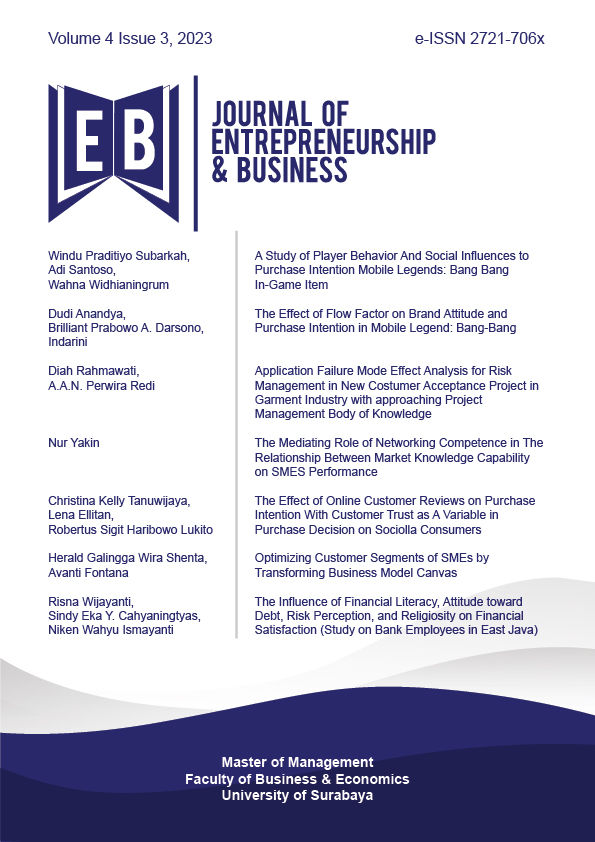The Mediating Role of Networking Competence in The Relationship Between Market Knowledge Capability on SMES Performance
 Abstract Views:
496 times
Abstract Views:
496 times
 PDF Downloads:
344 times
PDF Downloads:
344 times
Abstract
Purpose
This article investigated market knowledge capability’ role in enhancing performance and the impact of networking competence on SMEs’ performance.
Method: The samples studied were 162 export-oriented furniture SMEs from Sukoharjo. The purposive sampling technique collected the data. Only 142 samples were declared complete and feasible to continue hypothesis testing. Structural Equation Modeling (SEM) was implemented to check the hypothesis model.
Result: This study found that the market knowledge capability constructs positively and significantly affected SMEs’ performance. Market knowledge positively influenced networking competence, while networking competence positively and significantly affected SMEs’ performance.
Downloads
References
Åkerman, N. (2014). Knowledge-acquisition strategies and the effects on market knowledge – profiling the internationalizing firm. European Management Journal. doi:10.1016/j.emj.2014.06.003
Barney, J. (1991a). Firm Resources and Sustained Competitive Advantage. Journal of Management, Vol. 17, 1;, pg. 99.
Barney, J. (1991b). Firm Resources and Sustained Competitive Advantage. Journal of Management, vol. 17, 1, pg. 99.
Borchert, P., & Bruhn, M. Z. (2010). The Influence of Human and Relational Capital on the Magnitude of Early Venture Goal. Journal of Applied Management and Entrepreneurship, vol. 15, 4, pg. 53.
Boumarafi, B., & Jabnoun, N. (2008). Knowledge management and performance in UAE business organizations. Knowledge Management Research & Practice, 6(3), 233-238. doi:10.1057/kmrp.2008.16
Chang, S.-H., Chen, C.-H., & Ho, Y. C. (2012). A Study of Marketing Performance Evaluation System for Notebook Distributors. International Journal of Business and Management, 7(13). doi:10.5539/ijbm.v7n13p85
Chew, D. A. S., Yan, S., & Cheah, C. Y. J. (2008). Core capability and competitive strategy for construction SMEs in China. Chinese Management Studies, Vol. 2 No. 3, pp. 203-214. doi:10.1108/17506140810895898
Clarke, A., & Fuller, M. (2011). Collaborative Strategic Management: Strategy Formulation and Implementation by Multi-Organizational Cross-Sector Social Partnerships. Journal of Business Ethics, 94(S1), 85-101. doi:10.1007/s10551-011-0781-5
Constantinescu, A. (2012). The Internet Marketing and the SMEs. A comparative analysis of dentistry strategies for online and printed advertising. International Conference “Marketing – from information to decision” 5th Edition.
Darroch, J. (2005). Knowledge management, innovation and firm performance. Journal of Knowledge Management, Vol. 9, 3;, pg. 101.
Gama, A. P. d. (2011). An expanded model of marketing performance. Marketing Intelligence & Planning, 29(7), 643-661. doi:10.1108/02634501111178677
GertHuman, & Naude, P. (2009). Exploring the relationship between network competence, network capability and firm performance: A resource-based perspective in an emerging economy. Management Dynamics, Volume 18 no 1, pg. 2 - 14.
Gomes, C. F., Yasin, M. M., & Lisboa, J. o. V. (2009). Benchmarking competitive methods and strategic choices of Portuguese SMEs. Benchmarking: An International Journal of Agribusiness in Developing and Emerging Economies, Vol. 16 No. 6, 2009, pp. 729-740. doi:10.1108/14635770911000079
Hindasah, L., & Nuryakin, N. (2020). The Relationship between Organizational Capability, Organizational Learning and Financial Performance. The Journal of Asian Finance, Economics and Business, 7(8), 625-633. doi:10.13106/jafeb.2020.vol7.no8.625
Hoffman, J. J., Hoelscher, M. L., & Sherif, K. (2005). Social capital, knowledge management, and sustained superior performance. Journal of Knowledge Management, 9(3), 93-100. doi:10.1108/13673270510602791
Hormiga, E., Batista-Canino, R. M., & Sánchez-Medina, A. (2011). The Impact of Relational Capital on the Success of New Business Start-Ups. Journal of Small Business Management, Vol. 49, 4, pg. 617.
Hunt, S. D., & Morgan, R. M. (1999). The resource-advantage theory of competition: Dynamics, path dependencies, and evolutionary dimension. Journal of Marketing, vol. 60, 4, pg. 107.
Ismail, A., & Mamat, M. (2012). The Relationship Between Information Technology, Process Innovation and Organizational Performance. International Journal of Business and Social Science, Vol. 3 No. 2, pp. 268 - 274.
Jaakkola, M., Möller, K., Parvinen, P., Evanschitzky, H., & Mühlbacher, H. (2010). Strategic marketing and business performance: A study in three European ‘engineering countries’. Industrial Marketing Management, 39(8), 1300-1310. doi:10.1016/j.indmarman.2010.06.005
Jian, Z., & Wang, C. (2013). The impacts of network competence, knowledge sharing on service innovation performance: Moderating role of relationship quality. Journal of Industrial Engineering and Management, 6(1). doi:10.3926/jiem.659
Kanagal, N. (2002). Role of Relationship Marketing in Competitive Marketing Strategy. Journal of Management and Marketing Research.
Kaplan, R. S., & Norton, D. P. (1992). The Balanced Scorecard - Measures that Drive Performance. Harvard Business Review.
Kiessling, T. S., Richey, R. G., Meng, J., & Dabic, M. (2009). Exploring knowledge management to organizational performance outcomes in a transitional economy. Journal of World Business, 44(4), 421-433. doi:10.1016/j.jwb.2008.11.006
Lamprinopoulou, C., & Tregear, A. (2011). Inter-firm relations in SME clusters and the link to marketing performance. Journal of Business & Industrial Marketing, 26(6), 421-429. doi:10.1108/08858621111156412
Lawson-Body, A., & O’Keefe, T. P. (2006). Interorganizational Relationships B2B. Journal of Electronic Commerce in Organizations, Volume 4, (Issue 4), 1 - 21.
Lee, C., Lee, K., & Penning, J. M. (2001). Internal Capabilities, Eternal Networks, and Performance : A Study on Technology Based Ventures. Strategic Management Journal, Vol. 22, pg. 615–640. doi:10.1002/smj.181
Lee, J., & Lee, D.-R. (2009). Labor-management partnership at Korean firms. Personnel Review, Vol. 38 No. 4, pp. 432-452. doi:10.1108/00483480910956364
Lee, S., Kim, B. G., & Kim, H. (2012). An integrated view of knowledge management for performance. Journal of Knowledge Management, 16(2), 183-203. doi:10.1108/13673271211218807
Lin, C.-H., & Peng, C.-H. (2008). The innovativeness effect of market orientation and learning orientation on business performance. International Journal of Manpower, Vol. 29 No. 8,, pp. 752-772. doi:10.1108/01437720810919332
Lin, C. Y.-Y., & Chen, M. Y.-C. (2007). Does innovation lead to performance An empirical study of SMEs in Taiwan. Management Research News, Vol. 30 No. 2,, pp. 115-132. doi:10.1108/01409170710722955
Lu, H., Feng, S., Trienekens, J. H., & Omta, S. W. F. (2012). Network strength, transaction-specific investments, inter-personal trust, and relationship satisfaction in Chinese agri-food SMEs. China Agricultural Economic Review, 4(3), 363-378. doi:10.1108/17561371211263374
Moen, O., Madsen, T. K., & Aspelund, A. (2008). The importance of the internet in international business-to-business markets. International Marketing Review, Vol. 25 No. 5, pp. 487-503. doi:10.1108/02651330810904053
Mohannak, K. (2007). Innovation networks and capability building in the Australian high technology SMEs. European Journal of Innovation Management Decision, Vol. 10 No. 2, pp. 236-251. doi:10.1108/14601060710745279
Mort, G. S., & Weerawardena, J. (2006). Networking capability and international entrepreneurship: How networks function in Australian born global firms. International Marketing Review, 23(5), 549-572. doi:10.1108/02651330610703445
Nuryakin, & Ardyan, E. (2018). SMEs’ marketing performance: the mediating role of market entry capability. Journal of Research in Marketing and Entrepreneurship, oct 2018(2).
Nuryakin, Widayanti, R., Damayanti, R., & Susanto. (2021). The importance of market information accessibility to enhancing SMEs Indonesian superior financial performance International Journal of Business Innovation and Research, Vol 25(1), pg. 1 - 18.
Nuryakin, Widowati, R., & Fatmawati, I. (2018). Network Advantage: Mediating Effect on Business Performance. Scientific Annals of Economics and Business, 65(4), 443-457.
Nuryakin, N. F. (2021). Network capability, relational capability and Indonesian manufacturing SME performance: an empirical analysis of the mediating role of product innovation. ENGINEERING MANAGEmENT, 13(1).
Olson, E. M., & Slater, S. F. (2002). The balanced scorecard, competitive strategy, and performance. Business Horizons Journal.
Panigyrakis, G. G., & Theodoridis, P. K. (2009). Internal marketing impact on business performance in a retail context. International Journal of Retail & Distribution Management, 37(7), 600-628. doi:10.1108/09590550910964620
Pinho, J. C. M. R. (2011). Social capital and dynamic capabilities in international performance of SMEs. Journal of Strategy and Management, 4(4), 404-421. doi:10.1108/17554251111181034
Soliman, H. S. (2011). Customer Relationship Management and Its Relationship to the Marketing Performance. International Journal of Business and Social Science, Vol. 2 No. 10.
Taghieh, M. B., Taghieh, S., & Poorzamani, Z. (2013). The effects of relational capital (customer) on the market value and financial performance. European Online Journal of Natural and Social Sciences, vol.2, No. 3(s),, pp. 207-211.
Taiwo, A. S. (2010). Strategic Marketing Strategies on the Performance of Firms in Nigerian oil and gas Industry. Journal of Emerging Trends in Economics and Management Sciences, vol. 1 (1), pp. 23-36.
Zaim, S., Bayyurt, N., Tarim, M., Zaim, H., & Guc, Y. (2013). System Dynamics Modeling of a Knowledge Management Process: A Case Study in Turkish Airlines. Procedia - Social and Behavioral Sciences, 99, 545-552. doi:10.1016/j.sbspro.2013.10.524
Zhou, K. Z., Brown, J. R., Dev, C. S., & Agarwal, S. (2007). The effects of customer and competitor orientations on performance in global markets: a contingency analysis. Journal of International Business Studies, 38(2), 303-319. doi:10.1057/palgrave.jibs.8400259
Zohdi, M., Shafeai, R., & Hashemi, R. (2013). Influence of relational capabilities on Business performance Case of: Kermanshah industrial city SMEs. International Research Journal of Applied and Basic Sciences, vol. Vol, 4 (3), pg. 589-596.

This work is licensed under a Creative Commons Attribution 4.0 International License.
Articles published in Journal of Entrepreneurship & Business are licensed under a Creative Commons Attribution 4.0 International (CC BY) license. You are free to copy, transform, or redistribute articles for any lawful purpose in any medium, provided you give appropriate credit to the original author(s) and the journal, link to the license, and indicate if changes were made.
Authors submitting to this journal agree to make their work freely available under the CC BY 4.0 license, ensuring broad dissemination and reuse. The full license details can be accessed at https://creativecommons.org/licenses/by/4.0/.
This ensures that they receive the maximum dissemination because there are no barriers to access. This license allows readers to disseminate and reuse the paper, but always requires them to grant the authors and the first publication full credit.
While JEB upholds ethical publishing standards, the responsibility for ensuring originality and compliance with copyright regulations lies with the authors. The journal is not liable for any legal claims related to the content of published articles.
For further inquiries, please contact the editorial team.

 DOI:
DOI:











